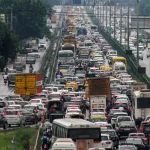CRIMINALIZATION OF POLITICS
Criminalization of politics is one of the most pressing challenges confronting Indian democracy. Despite seven decades of constitutional democracy, regular elections, and strong institutions, the political system has been unable to insulate itself from the steady entry of individuals with criminal backgrounds. The problem is not new, but its scale and persistence have reached alarming levels. Unless addressed decisively, it risks corroding the moral foundation of public life and eroding the credibility of democratic institutions.
What began as stray aberrations has now assumed the proportions of a systemic rot. Nearly half of today’s lawmakers in Parliament face criminal cases—some accused of heinous crimes such as murder, rape, and kidnapping. The cancer of criminalization has spread so deeply that it threatens to hollow out the very credibility of India’s democratic institutions.
It is against this troubling backdrop that the Constitution (One Hundred and Thirtieth Amendment) Bill, 2025 was introduced in the Lok Sabha on August 20. The Bill is not just another legislative proposal—it is an attempt to reassert moral clarity in politics. It is a long-overdue attempt to draw a line of moral accountability in politics.
It stipulates that Prime Ministers, Chief Ministers, and Ministers must vacate office if arrested and detained for serious offences carrying a minimum punishment of five years. They can return once released or acquitted, but the message is clear: governments cannot and must not be run from prison cells.
This is not vendetta politics; it is constitutional morality. It is about drawing a civilisational red line—those entrusted to make laws must not simultaneously live under the shadow of breaking them.
Yet, ironically, this move has triggered sharp opposition from sections of the political spectrum. The divergence reflects not just differences in policy but a deeper unwillingness among many to break the nexus between power and impunity.
The Normalization of Criminal Politics
The statistics are chilling. In 2009, 30% of MPs had criminal cases pending. By 2014, the figure rose to 34%. In 2019, 43% of MPs (233 members) faced charges, with 29% accused of serious crimes. The 2024 Lok Sabha set a new record: 46% of winning candidates declared criminal cases, including 170 charged with grave offences.
The story at the state level is even bleaker. In some assemblies, more than half of the legislators face pending criminal cases. Democracy, in many states, has been taken hostage by money power, muscle power, and entrenched networks of patronage.
What is particularly alarming is that voters often reward such candidates, sometimes with overwhelming margins. Local influence, coercion, and the ability to mobilise resources frequently outweigh questions of morality and legality. It is not just a failure of law—it is a failure of collective conscience.
The Scale of the Problem
The extent of criminalisation in Indian politics can be gauged from hard data. The Association for Democratic Reforms (ADR), which has consistently analysed the affidavits of candidates, has revealed a disturbing upward trajectory:
- In the 2009 Lok Sabha, 30% of members of Parliament had pending criminal cases. In the 2014 Lok Sabha, this rose to 34%. By 2019, 233 MPs — 43% of the House — faced criminal charges.
- The 2024 Lok Sabha set a new record: 251 winning candidates, or 46% of the total strength, declared criminal cases against themselves. Out of these, 170 (31%) faced serious charges such as murder, attempt to murder, rape, kidnapping, and crimes against women.
- The picture at the state level is equally bleak, often worse. State assemblies across the country have an even higher percentage of members with criminal records, suggesting that the problem is deeply entrenched in local politics. In some states, more than half of the legislators have pending criminal cases.
Paradoxically, while citizens often express outrage at corruption and criminalisation, electoral outcomes show that candidates with criminal backgrounds continue to win — sometimes with overwhelming margins. Money, muscle power, and local influence frequently outweigh issues of morality and legality in the calculus of electoral politics.
Why Criminalization Persists
The persistence of criminalization is not accidental. It is the outcome of structural incentives and systemic weaknesses. Elections are prohibitively expensive. Candidates with criminal connections often command vast financial and coercive resources that make them formidable. Politicians provide protection to criminal actors in exchange for electoral muscle, while criminals acquire legitimacy by entering politics themselves.
Judicial delays guarantee impunity. Criminal trials often drag on for decades, allowing accused leaders to contest, win, and even govern without fear of timely conviction. Witnesses are intimidated, cases are delayed, and legal loopholes exploited to perpetuate a cycle of evasion. Criminalisation persists because it serves too many entrenched interests—political, financial, and electoral.
Why the 130th Amendment Matters
The 130th Amendment Bill is a modest yet crucial intervention. Its provisions are explicit. If a Prime Minister, Chief Minister, or Minister is arrested and detained for more than 30 days on charges carrying a minimum punishment of five years, they will automatically cease to hold office. They can’t run the government from jail.
The President or the Governor will act on the advice of the Prime Minister or Chief Minister. If such advice is not given within 30 days, the position will lapse automatically. The law is designed to extend to Delhi, Puducherry, and Jammu & Kashmir, ensuring uniform standards. There is a provision to return to office once the leader is released or acquitted, ensuring the law does not permanently bar political participation. The measure is neither draconian nor unprecedented. Globally, India’s tolerance for tainted politicians stands out as anomalously permissive.
In the UK, anyone sentenced to more than one year in prison is automatically disqualified. In Brazil, the “Clean Slate Law” of 2010 disbars individuals convicted by an appellate court for eight years. In South Africa, anyone sentenced to more than 12 months is barred from serving in Parliament unless pardoned. In the Philippines and Indonesia, convicted politicians are disqualified outright.
Compared to these, India’s framework has been excessively lenient. The 130th Amendment is therefore not radical—it is the bare minimum to align India with global democratic standards.
Opposition and Political Hypocrisy
The Bill has faced opposition from several political quarters. Critics argue that arrest does not equal guilt, that the presumption of innocence must prevail, and that the law may be misused for political vendetta. While such concerns are not entirely unfounded, the Bill provides adequate safeguards through judicial oversight and reinstatement after release.
But the real question is moral, not procedural. If a government employee cannot remain in service after being arrested for a serious offence, why should the Prime Minister or a Chief Minister enjoy a lower standard of accountability? Should those who govern India not be held to a higher moral bar than a clerk or constable?
To oppose the Bill outright, without offering constructive safeguards, is to appear defensive of privilege and permissive of impunity.
The Cost of Doing Nothing
Allowing the status quo to persist carries severe consequences. When lawbreakers become law makers, public trust in Parliament and state assemblies declines. Besides, leaders facing serious cases are more likely to use office to shield them, undermining impartial governance. Also normalising crime in politics lowers the ethical bar for society at large.
We have seen politicians in office influence investigations, weaken enforcement, and intimidate witnesses. In short, criminalization corrodes the political system from within, eating away at both governance and morality. This is how democracies decay—not by sudden collapse but through the steady normalisation of corruption and crime.
The Road Ahead
The 130th Amendment is only a beginning. Cleansing politics demands a broader agenda:
- Stricter disqualification norms to bar those facing heinous charges from contesting elections until cleared.
- Time-bound trials through fast-track courts to ensure speedy disposal of cases involving legislators.
- Accountability for parties, compelling them to deny tickets to tainted candidates.
- Empowered voters, aided by civil society and media in exposing criminal records, so informed choices prevail.
- Ultimately, no law can succeed unless voters refuse to reward criminality at the ballot box.
Conclusion: A Test of National Conscience
The criminalization of politics is not merely a political aberration; it is a societal compromise where expediency has trumped morality. The Constitution (One Hundred and Thirtieth Amendment) Bill is a crucial corrective—an overdue attempt to ensure that governance is not reduced to governance from prison.
The answer must come not only from Parliament but also from the people. If citizens continue to reward tainted candidates, no law can cleanse the Republic. But if society demands integrity, this Bill could mark the beginning of a new ethical contract between democracy and its people.
History will not judge us by excuses but by the standards we set. The time has come to declare, without equivocation, that public life in India is a responsibility demanding integrity—not a refuge for the powerful with tainted pasts.
(Author is a former Member of the legislative council of erstwhile State of Jammu & Kashmir and spokesperson of BJP JK-UT)








